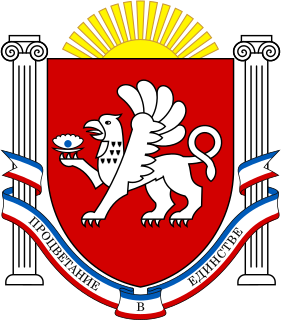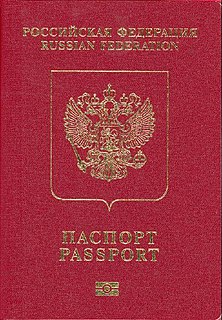
The State Council of Crimea is the parliament of the Republic of Crimea. It had previously been called the 'Supreme Council of Crimea but changed its name in March 2014 following a vote by the Ukrainian parliament to dissolve the Supreme Council of Crimea. The Parliament is housed in the Parliament building in the centre of Simferopol.
The politics of Crimea today is that of the Republic of Crimea on one hand, and that of the federal city of Sevastopol on the other, within the context of the largely unrecognised annexation of Crimea by the Russian Federation in March 2014.

The Party "Soyuz" is a national political party of Ukraine that is mostly based in Crimea. It was registered in June 1997 under a registration number 867.

Russian Bloc is a currently banned political party in Ukraine; that was registered in March 2001.

Russkoye Yedinstvo was a political party in Crimea, registered in October 2008. On 30 April 2014 a Kiev Court banned the party "from activity on the territory of Ukraine". Party leader Sergey Aksyonov was instrumental in making possible the annexation of Crimea by the Russian Federation. The party was based in Crimea, which has a Russian-speaking majority. The party was dissolved a year after the annexation of Crimea.

Presidential elections were held in Ukraine on 25 May 2014, resulting in Petro Poroshenko being elected President of Ukraine. Originally scheduled to take place on 29 March 2015, the date was changed following the 2014 Ukrainian revolution. Poroshenko won the elections with 54.7% of the votes, enough to win in a single round. His closest competitor was Yulia Tymoshenko, who emerged with 12.81% of the votes. The Central Election Commission reported voter turnout at over 60% excluding those regions not under government control. Since Poroshenko obtained an absolute majority in the first round, a run-off second ballot was unnecessary.

A snap election of the Verkhovna Rada took place on 26 October 2014.

A controversial referendum on the status of Crimea was held on March 16, 2014, by the legislature of the Autonomous Republic of Crimea and by the local government of Sevastopol. The referendum requested local populations whether they wanted to join Russia as a federal subject, or if they wanted to restore the 1992 Crimean constitution and Crimea's status as a part of Ukraine. After the events of Euromaidan, the referendum was held during a Russian military takeover of Crimea. The referendum is not internationally recognized by most countries.

The annexation of Crimea by the Russian Federation took place in the aftermath of the 2014 Ukrainian revolution. On 22–23 February, Russian President Vladimir Putin convened an all-night meeting with security services chiefs to discuss extrication of deposed President, Viktor Yanukovych, and at the end of that meeting Putin remarked that "we must start working on returning Crimea to Russia.". Russia sent in soldiers on February 27, 2014. Crimea held a referendum. According to official Russian and Crimean sources 95% voted to reunite with Russia. The legitimacy of the referendum has been questioned by the international community on both legal and procedural grounds.
![Autonomous Republic of Crimea administrative division of Ukraine since 1992, not occupying the whole peninsula [see Q15966495 for Russian subdivision proclaimed in 2014]](https://upload.wikimedia.org/wikipedia/commons/thumb/a/aa/Flag_of_Crimea.svg/320px-Flag_of_Crimea.svg.png)
The Autonomous Republic of Crimea is, de jure, an autonomous republic of Ukraine encompassing most of Crimea, though, de facto, it was annexed by the Russian Federation in 2014.

The "Agreement between the Russian Federation and Ukraine on the Parameters of the Division of the Black Sea Fleet", the "Agreement between the Russian Federation and Ukraine on the Status and Conditions of the Presence of the Russian Federation Black Sea Fleet on the territory of Ukraine" and "Agreement between the Government of the Russian Federation and the Government of Ukraine on Payments Associated with the Division of the Black Sea Fleet and Its Presence on the territory of Ukraine" were the three treaties signed between Russia and Ukraine on 28 May 1997 whereby the two countries established two independent national fleets, divided armaments and bases between them., and set out conditions for basing of the Russian Black Sea Fleet in Crimea.

The 2014 Ukrainian local elections took place on 25 May 2014, four years after the conclusion of the last local elections, which took place in October 2010. The elections occurred during the political crisis in the aftermath of the 2014 Ukrainian revolution.

Crimean speech of President Vladimir Putin refers to a speech by the Russian president Vladimir Putin's on March 18, 2014 to both chambers of the Federal Assembly of the Russian Federation in connection with the request for admission by the Crimean parliament of the republic in the Russian Federation. He spoke in the St. George Hall of the Grand Kremlin Palace in the Moscow Kremlin.
The following lists events that happened in 2014 in Russia.
Ministry of Crimean Affairs is a federal ministry in Dmitry Medvedev's government which was established in March 31, 2014; and dissolved in July 15, 2015.

The next Ukrainian parliamentary elections must be held no later than 2019. Due to the March 2014 annexation of Crimea by Russia and the occupation of parts of Donetsk Oblast and Luhansk Oblast by separatists, only 424 seats in Verkhovna Rada can currently be elected under current laws and roughly 12 percent of voting-age citizens cannot participate in the elections. Under current election laws 225 members of the Verkhovna Rada are elected by nationwide open party-list proportional representation with 5% electoral election threshold and the other 199 seats elected in constituencies with a first-past-the-post electoral system in one round.

Legislative elections were held in Russia on 18 September 2016, having been brought forward from 4 December. At stake were the 450 seats in the State Duma of the 7th convocation, the lower house of the Federal Assembly of Russia. Prior to the election United Russia had been the ruling party since winning the 2011 elections with 49.32% of the vote, and taking 238 seats (53%) of the seats in the State Duma.


























